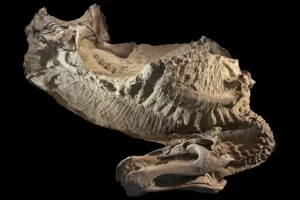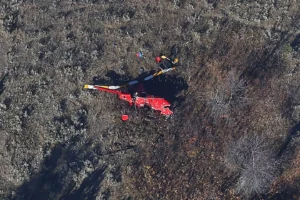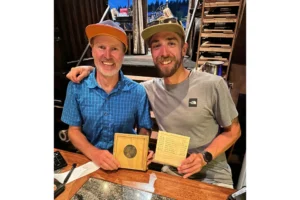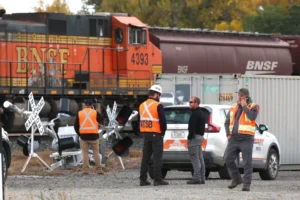THRIVING SMALL BUSINESSES IN WYOMING: Meadery Packages Western Lore and Mythology into Winning Recipe
Gillette’s Big Lost Meadery expands into national and Asian markets
- Published In: Other News & Features
- Last Updated: Sep 11, 2023

Sam Clikeman, 43, co-owner of the Gillette-based Big Lost Meadery, taps into myths to create a unique experience for customers. The business, which opened in 2014, has an export division that ships mead products to South Dakota, North Dakota, Iowa and Colorado, and direct sells to households in 43 states. (Wyoming Truth photo by Jennifer Kocher)

By Jennifer Kocher
Special to the Wyoming Truth
GILLETTE, Wyo.–There aren’t many places in the state where a person can drink a glass of mead out of a Viking horn. In fact, there aren’t a lot of places to drink mead at all. Big Lost Meadery and Brewery in Gillette is the only one of its kind in Wyoming and one of roughly 450 meaderies nationally.
Why mead? For co-owner Sam Clikeman, it was an accidental stroke of luck. The 43-year-old full-time fireman and Gillette native had been brewing craft beers and wine as a hobby when a friend challenged him to make some mead.
No way, Clikeman told him.
Mead, also known as “honey wine,” dates back thousands of years to the Vikings. Because honey is the primary ingredient, it’s much more expensive to make than craft beers that use malt, hops and yeast. Honey costs $5.50 to $6.50 a pound wholesale and up to $9 to $11 retail, according to the U.S. Department of Agriculture. It also takes up a year to brew a five-gallon carboy of mead – compared to mere weeks for beer – and Clikeman didn’t want to waste the time for a paltry five gallons that may or may not turn out well.
But when his friend, Shane Anderson, offered him 125 pounds of honey at a discount from a Montana producer, Clikeman gave it a shot.
“It turned out pretty well,” he said. “I quit making beer and wine and just started focusing on that.”
In 2014, Clikeman opened the Big Lost Meadery in downtown Gillette. Three years later, his brother-in-law and partner, Bob Hewitt-Gaffney, quit his teaching job to join the business.

Apart from learning how to make mead, Clikeman had to figure out how to market it in a state that loves its beer and whiskey. It turned out to be a huge learning curve for Clikeman, who had no business experience. He loaded up his Chevy Malibu with product and drove up to 40,000 miles throughout Wyoming to personally sell to area distributors.
As the owner of the first meadery in Wyoming, Clikeman also had to work with city and state officials to navigate licensure and regulations. That turned out to be the biggest headache in the process, Clikeman noted, but he figured out how to sell mead legally both in Wyoming and elsewhere.
Today, the partners split the duties, with Hewitt-Gaffney overseeing production and Clikeman handling administrative duties and marketing.
Since opening just under a decade ago, the duo and their six employees have grown the bricks-and-mortar bar and meadery to include a brewery and an export operation that ships their mead products to South Dakota, North Dakota, Iowa and Colorado, and direct sells to households in 43 states. Most recently, they expanded into Taiwan.
Selling the myth
Clikeman credits the duo’s business success to their single-minded mission to be the most prolific meadery in the U.S. with their products dominating the shelves. To be the best, Clikeman knew he had to develop a high-quality product that stood out among other meaderies.
Currently, Big Lost Meadery produces about 5,000 gallons per year. This includes two year-round meads and three seasonal products. Clikeman also rotates about 30 other meads annually at the bar.
“The whole goal is to build something to be proud of and something that we can put on the map outside of coal and oil,” he said.
Clikeman sought to encapsulate the history of the beverage while offering a mythical sense of place. To this point, all of his meads – including Wild Man, Crazy Woman, Flathead Warrior, Sweet Dame and Island Gypsy – come with lengthy tales about their fictional lives that Clikeman writes himself.
“It’s kind of a Viking mountain man, Western style,” he said. “It’s a very, very Wyoming thing. Big Lost as a concept more than anything else.”
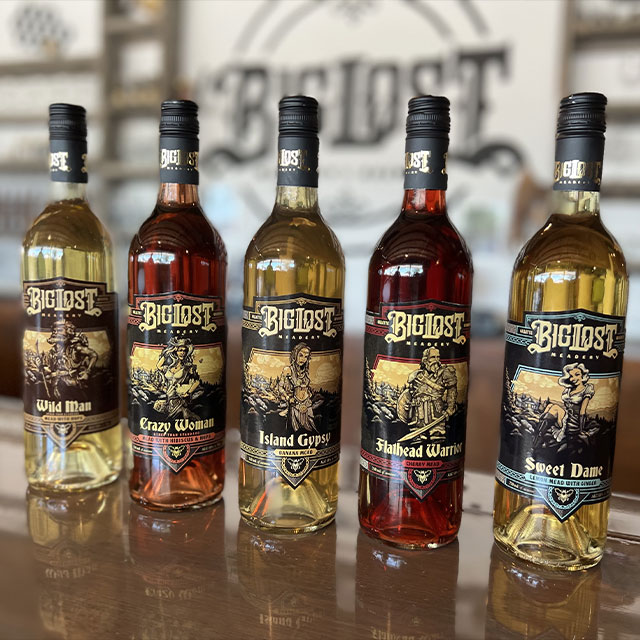
The idea is for customers to read the stories and get lost in them, Clikeman said, noting the concept of big lost stems from a fictional cabin somewhere out in the mountains of a Western town, where the characters’ lives intersect and where customers can imagine being.
“We’ve never been there, but we know it exists,” Clikeman said. “It’s a place in the middle of nowhere, where you can just get ‘big lost’ in the moment and enjoy it for what it is.”
Winning recipe
The concept extends to the interior of the establishment. Unlike other bars and restaurants replete with competing big screen TVs, poker machines or pool tables, Big Lost Meadery is a mishmash of homemade tables and chairs situated around a large fireplace nestled in the corner. The only sound is the soft hum of Irish music.
“We want people to come in and tune out and put their electronic devices down,” he said.
The concept has caught on with the Big Lost Meadery becoming a must-stop for locals and tourists traveling on 1-90 who are looking for a unique experience.
A large world map Clikeman hung up on one wall six months ago is full of pins denoting all of the out-of-state customers, as well as visitors from all seven continents.
The concept also appeals to customers in Asian markets. In June, Clikeman traveled to Taiwan as part of the state’s Asia Pacific Trade Office (PTO) that was established in 2018 by former Gov. Matt Mead to facilitate Wyoming agricultural exports to Southeast Asia. Big Lost meads are currently distributed in Taiwan and Hong Kong; they will be available soon in Thailand. These sales account for about 5% of sales, but Clikeman is hoping to expand that.
Clikeman credits Wyoming’s friendly business environment, as well as its citizens’ practice of supporting local businesses, for Big Lost Meadery’s growth.
“The American dream is dead in a lot of parts of the country, but not in Gillette,” he said. “Here, if you are willing to work hard and put in long hours, you can change your stars.”



